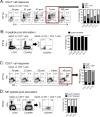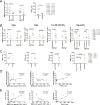Recovery from the Middle East respiratory syndrome is associated with antibody and T-cell responses
- PMID: 28778905
- PMCID: PMC5576145
- DOI: 10.1126/sciimmunol.aan5393
Recovery from the Middle East respiratory syndrome is associated with antibody and T-cell responses
Abstract
The Middle East respiratory syndrome coronavirus (MERS-CoV) causes a highly lethal pneumonia. MERS was recently identified as a candidate for vaccine development, but most efforts focus on antibody responses, which are often transient after CoV infections. CoV-specific T cells are generally long-lived, but the virus-specific T cell response has not been addressed in MERS patients. We obtained peripheral blood mononuclear cells and/or sera from 21 MERS survivors. We detected MERS-CoV-specific CD4+ and CD8+ T cell responses in all MERS survivors and demonstrated functionality by measuring cytokine expression after peptide stimulation. Neutralizing (PRNT50) antibody titers measured in vitro predicted serum protective ability in infected mice and correlated with CD4+ but not CD8+ T cell responses; patients with higher PRNT50 and CD4+ T cell responses had longer intensive care unit stays and prolonged virus shedding and required ventilation. Survivors with undetectable MERS-CoV-specific antibody responses mounted CD8+ T cell responses comparable with those of the whole cohort. There were no correlations between age, disease severity, comorbidities, and virus-specific CD8+ T cell responses. In conclusion, measurements of MERS-CoV-specific T cell responses may be useful for predicting prognosis, monitoring vaccine efficacy, and identifying MERS patients with mild disease in epidemiological studies and will complement virus-specific antibody measurements.
Copyright © 2017 The Authors, some rights reserved; exclusive licensee American Association for the Advancement of Science. No claim to original U.S. Government Works.
Conflict of interest statement
Figures





References
-
- Cho SY, Kang JM, Ha YE, Park GE, Lee JY, Ko JH, Lee JY, Kim JM, Kang CI, Jo IJ, Ryu JG, Choi JR, Kim S, Huh HJ, Ki CS, Kang ES, Peck KR, Dhong HJ, Song JH, Chung DR, Kim YJ. MERS-CoV outbreak following a single patient exposure in an emergency room in South Korea: an epidemiological outbreak study. Lancet. 2016;388:994–1001. - PMC - PubMed
-
- Azhar EI, El-Kafrawy SA, Farraj SA, Hassan AM, Al-Saeed MS, Hashem AM, Madani TA. Evidence for camel-to-human transmission of MERS coronavirus. New Engl J Med. 2014;370:2499–2505. - PubMed
-
- Ng DL, Al Hosani F, Keating MK, Gerber SI, Jones TL, Metcalfe MG, Tong S, Tao Y, Alami NN, Haynes LM, Mutei MA, Abdel-Wareth L, Uyeki TM, Swerdlow DL, Barakat M, Zaki SR. Clinicopathologic, Immunohistochemical, and Ultrastructural Findings of a Fatal Case of Middle East Respiratory Syndrome Coronavirus Infection in the United Arab Emirates, April 2014. Am J Pathol. 2016;186:652–658. - PMC - PubMed
Grants and funding
LinkOut - more resources
Full Text Sources
Other Literature Sources
Medical
Molecular Biology Databases
Research Materials

